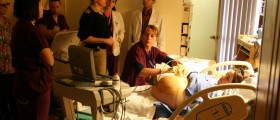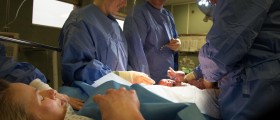
Is Your Baby Having Hiccups?
If you are a mother-to-be, especially if you are already in your second or third trimester, you are bound to experience fetal movement in your stomach. Your baby will turn around, kick and move quite often. You will surely be able to feel, or maybe even see this action from the outside. Nevertheless, you definitely did not know that the child in your womb can have hiccups, just as you do. Yes, it is possible, and it is not that strange of an occasion after all. There are several reasons why this phenomenon takes place. Therefore, read on and know how, and why does your baby have hiccups.
In fact, once these fetal hiccups occur, and they will happen at least once during every pregnancy, the mother will fell a spasm in her stomach, much less prominent than an occasional kick she is already used to. However, these hiccups serve a purpose. They trigger the development of the baby's lung functions which will enable it to breathe once born. Moreover, this phenomenon develops the baby's ability to swallow, suck and do perform other important functions we all are capable of doing with our mouth.
Reasons Behind Fetal Hiccups
As mentioned above, fetal hiccups are likely to affect your child on the onset of the second trimester, and later. Then, the baby's central nervous system gets completely developed, triggering the hiccups, among many other things. These hiccups may be heard on a Doppler heart machine. So, mothers who are unable to hear their baby's first hiccups may use this method to experience this moment, since, once they start, fetal hiccups may last for more than half an hour.
Additional reasons behind fetal hiccups are related to the regulation of the baby's heart rate. Also, since this phenomenon, as mentioned above, develops the child's oral and lung functions, it “teaches” the baby highly important skills they will need to use while breastfeeding.
Nevertheless, even though the causes may be positive most of the time, if the hiccups last for too long, or happen too often, there might be a chance that the umbilical cord got wrapped around the baby's neck. Therefore, in any excessive experiences of this phenomenon, the mother should seek medicaladvice.
However, most of the times, fetal hiccups are completely harmless and more positive than you can imagine. All in all, you cannot stop them in any given way. Thus, sit back, relax, and witness these magical moments your child is experiencing before he or she even knows it.
















Your thoughts on this
Loading...